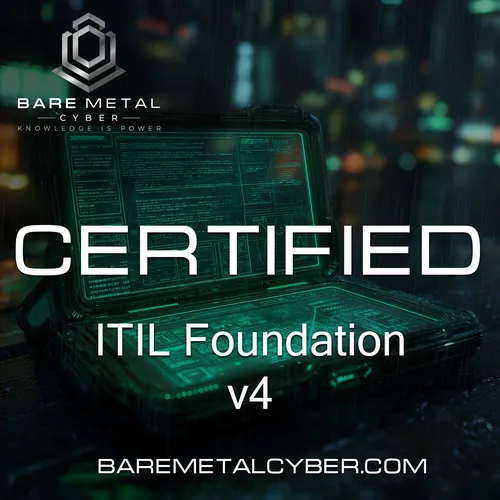
Certified - ITIL Foundation v4 Audio Course
Start your journey into ITIL with this Audio Course — an educational series designed to break down every key concept, from guiding principles to practices, in a way that’s clear, practical, and exam-ready. Each episode delves deeply into the ideas behind modern service management, helping you not only memorize but also truly understand how they apply in real-world contexts. Whether your goal is to strengthen your career skills or prepare with confidence for the ITIL Foundation exam, this series gives you the knowledge and clarity to succeed. Produced by BareMetalCyber.com
- Update frequency
- every day
- Average duration
- 24 minutes
- Episodes
- 58
- Years Active
- 2025

Episode 38: Partners and Suppliers — External Support Explained
The third dimension of service management highlights that no organization operates alone. Partners and suppliers play a critical role in delivering value, whether through hardware, software, cloud ho…

Episode 37: Cloud, Automation, and Emerging Tech in ITIL
Technology never stands still, and ITIL 4 recognizes that organizations must embrace change while managing risks. In this episode, we’ll focus on how cloud services, automation, and emerging technolo…

Episode 36: Information and Technology — Tools That Enable Services
The second dimension of service management, information and technology, provides the tools and data that enable modern services. In this episode, we’ll discuss how this dimension includes everything …

Episode 35: Communication and Collaboration in Teams
Strong collaboration is essential for organizational success, and ITIL underscores the need for effective communication within the people dimension. In this episode, we’ll explore why collaboration m…

Episode 34: Organizations and People — Roles, Culture, Competence
The first of the four dimensions focuses on organizations and people, reminding us that technology alone cannot deliver value. In this episode, we’ll explore how organizational structure, defined rol…

Episode 33: Introduction to the Four Dimensions
To understand ITIL 4 fully, you must see service management as more than just processes or technologies. In this episode, we’ll introduce the four dimensions of service management: organizations and …

Episode 32: Mini-Review: Seven Principles Recap
After exploring each guiding principle in detail, this episode serves as a recap to lock the concepts firmly in your memory. We’ll briefly revisit each principle — from “Focus on Value” through “Opti…

Episode 31: Exam Pitfalls Around Principles
Principles are straightforward in theory, but exam questions often test them in tricky ways. In this episode, we’ll walk through the most common pitfalls candidates face when answering principle-rela…

Episode 30: Guiding Principles in Daily Work
The value of guiding principles is proven not only in theory but in the everyday work of IT professionals. In this episode, we’ll translate the principles into relatable analogies and daily practices…

Episode 29: Interactions Between Principles — How They Work Together
While each guiding principle can stand alone, their true power emerges when they are applied together. In this episode, we’ll explore how the seven principles interact, often reinforcing each other i…

Episode 28: Optimize and Automate — Efficiency and Tools
The final guiding principle, “Optimize and Automate,” reflects modern IT realities where efficiency and technology play critical roles. In this episode, we’ll explain how optimization comes first: be…

Episode 27: Keep It Simple and Practical — Avoiding Complexity
Complexity is one of the biggest threats to efficiency, and ITIL’s principle “Keep It Simple and Practical” addresses this directly. In this episode, we’ll explore how simplicity reduces errors, acce…

Episode 26: Think and Work Holistically — The Big Picture
ITIL emphasizes that no element of a service operates in isolation, and this is captured in the guiding principle “Think and Work Holistically.” In this episode, we’ll explain how services, practices…

Episode 25: Collaborate and Promote Visibility — Team and Transparency
No service can succeed in isolation, which is why collaboration is essential in ITIL’s framework. In this episode, we’ll examine the guiding principle “Collaborate and Promote Visibility,” which emph…

Episode 24: Progress Iteratively with Feedback — Why Small Steps Matter
Big-bang changes often fail because they are too risky and too complex. The principle “Progress Iteratively with Feedback” reminds us that improvement should come in manageable steps, each guided by …

Episode 23: Start Where You Are — Assess Before You Build
Change and improvement are constant in IT, but too often organizations throw away what already works. This guiding principle, “Start Where You Are,” encourages you to first assess the current state b…

Episode 22: Focus on Value — Customer First
The first guiding principle is “Focus on Value,” and it captures the essence of why IT services exist at all. In this episode, we’ll explore how every decision, process, and improvement effort should…

Episode 21: What Are Guiding Principles?
Guiding principles are one of the most distinctive features of ITIL 4, offering simple yet powerful advice that can be applied universally across organizations and situations. In this episode, we’ll …

Episode 20: Service Relationships: Provision, Consumption, Management
Services don’t exist in a vacuum — they exist in relationships between providers and consumers. In this episode, we’ll examine the ITIL concept of service relationships, which involve three main elem…

Episode 19: Service Offerings Explained
Service offerings form the bridge between a service provider and the consumers who benefit from their services. In this episode, we’ll define what an offering is in ITIL terms — a formal description …